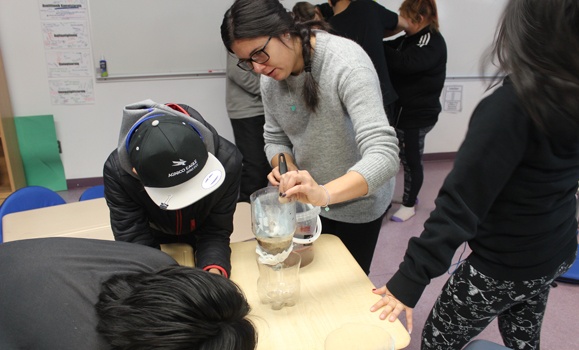Last fall, Nicole Bell and two fellow graduate students in the Civil and Resource Engineering department at Dal organized a youth science workshop in Baker Lake, Nunavut.
The idea for the workshop came during a discussion Nicole had with her supervisor, Dr. Rob Jamieson, about potential projects in Northern Canada.
Nicole received the Aboriginal Ambassadors in the Natural Sciences and Engineering Award from NSERC. The award is presented to Aboriginal students in science and engineering disciplines to promote interest in science and engineering in Aboriginal communities. The project, organized and executed with classmates Jenny Hayward and Audrey Hiscock, also received support from Agnico Eagle Mining Ltd.
“I have always been interested in working in the North,” says Nicole, who is of Inuit background and hails from Labrador. Previously, when she was an undergrad, she spent some time in Northern Labrador as a Co-op student.
“I was really interested in the work they were doing there and how everything surrounded the beliefs and tradition of the Inuit people.”
Water literacy
The workshop, Go with the Flow: Water Science Workshop was held in Jonah Amitnaaq Secondary School and Rachel Arngnamaktiq Elementary School for students in Grade 8-12.
The students participated in different fun experiments which taught them the basis of water purification, water quality, DNA extraction, and biodiversity.

“Science is fun,” says Nicole. She has always been interested in experimental aspect of science. “I remember just loving science and loving maths and experimenting at home when I grew up.”
Nicole observed that the students were excited to participate as they competed with each other to make the most efficient water filter and to most effectively clean muddy water.
“These kinds of workshops reach people in Southern Canada, but not up North,” she says. “They reach people in south a lot because travelling science groups would go across Canada and reach Southern populations, however, I find that they don’t often enough get to the northern regions.”
A viable career
Although Nicole’s primary purpose was to show the students some interesting experiments, she also wanted to present that science is a viable career option.
“Doing something like this for a small community, I really wanted to drive home the fact that there are really good opportunities in scholarships, and places in university you can go to to study these scientific topics, like water hydrology,” she says.
In total, over 100 students in the community participated in the water workshops. The high attendance suggests a need for such programs in communities were they are currently unavailable.
“I would love to organize this again, if I possibly could” she says. “We were thinking about doing it a little closer to home in some of the Mi’kmaw communities around Nova Scotia, but I would also love to go back to Baker Lake or other communities in Nunavut and the North.”
Nicole hopes that some of the students would be inspired or at least interested in pursuing a career in science after high school.
“One reason I did enjoy doing this workshop is that it brings out pride in my heritage and I wanted the kids to know that I am Aboriginal, I am Inuit too and that really opened their eyes.”

Comments
comments powered by Disqus

